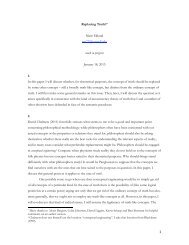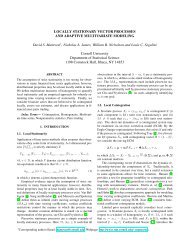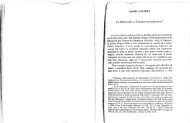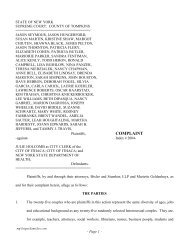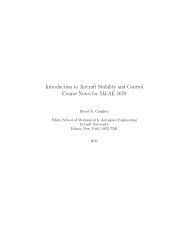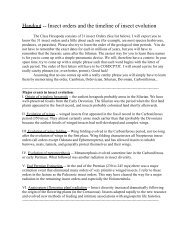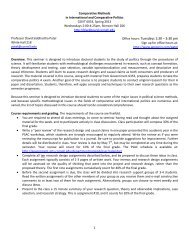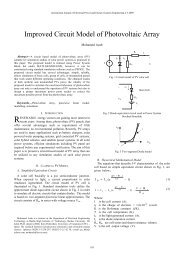Sallust's 'Jugurtha': Concord, Discord, and the Digressions
Sallust's 'Jugurtha': Concord, Discord, and the Digressions
Sallust's 'Jugurtha': Concord, Discord, and the Digressions
Create successful ePaper yourself
Turn your PDF publications into a flip-book with our unique Google optimized e-Paper software.
50 SALLUST'S JUGURTIHA: CONCORD, DISCORD, AND DIGRESSIONS<br />
<strong>and</strong> represented his interests? (There is nothing surprising about <strong>Sallust's</strong><br />
joining Caesar in 49 B.c.; like o<strong>the</strong>rs who had been excluded from political<br />
advancement, he saw that a Caesarian victory was a precondition for any<br />
fur<strong>the</strong>r role in public life.)5<br />
Whatever our view of <strong>the</strong> historical <strong>Sallust's</strong> political affiliation, <strong>the</strong><br />
passage explicitly advises <strong>the</strong> reader that <strong>the</strong> monograph he is about to read<br />
discusses <strong>the</strong> beginning of <strong>the</strong> sequence of events that led to <strong>the</strong><br />
devastation of Italy: <strong>the</strong> civil wars between Sulla <strong>and</strong> <strong>the</strong> 'Marians' in <strong>the</strong><br />
80s, but for <strong>Sallust's</strong> contemporaries perhaps more immediately those of<br />
<strong>the</strong> 40s B.C. The external <strong>and</strong> internal conflicts are tightly connected, <strong>and</strong><br />
Sallust links <strong>the</strong> two around <strong>the</strong> polarity of concord or co-operation versus<br />
discord <strong>and</strong> envy (<strong>the</strong>re are of course o<strong>the</strong>r moral issues whose consideration<br />
binds his text toge<strong>the</strong>r). That conceptual polarity is vividly brought to<br />
<strong>the</strong> fore by <strong>the</strong> deathbed advice given by Micipsa to his sons: 'small things<br />
grow as a result of concord, but <strong>the</strong> greatest things will waste away as a<br />
result of discord.'6<br />
The three digressions separate off <strong>and</strong> introduce phases of <strong>the</strong> war under<br />
various Roman comm<strong>and</strong>ers who represent different ethical states. A: <strong>the</strong><br />
catastrophic Roman failures under <strong>the</strong> comm<strong>and</strong> of <strong>the</strong> nobles Bestia <strong>and</strong><br />
Albinus, who notwithst<strong>and</strong>ing <strong>the</strong>ir hereditary claim to virtus suffer from<br />
<strong>the</strong> vices of avaritia <strong>and</strong> imperitia. B: <strong>the</strong> second phase, in which <strong>the</strong><br />
aristocratic general Metellus is indeed competent, but fails to make <strong>the</strong> best<br />
use of his subordinate Marius because of his arrogance. Finally C, <strong>the</strong> last<br />
phase of <strong>the</strong> war, in which Marius is successful, but not on his own. The<br />
final surrender of Jugurtha to <strong>the</strong> Romans by <strong>the</strong> Mauretanian king<br />
Bocchus is brought about by Marius' quaestor Sulla, to whom Sallust<br />
devotes a detailed <strong>and</strong> ambiguously positive character-sketch (ch. 95). The<br />
reader cannot ignore <strong>the</strong> moral: <strong>the</strong> best noble comm<strong>and</strong>er cannot succeed<br />
if he ignores <strong>the</strong> talent of a novus homo; but a talented novus homo can only<br />
succeed in co-operation with a talented aristocrat. Marius <strong>and</strong> Sulla<br />
toge<strong>the</strong>r brought success for Roman arms against <strong>the</strong> external threat;<br />
contrast <strong>the</strong> 'bellum atque vastitas Italiae' later brought about by <strong>the</strong>ir<br />
discord, which 'I am not sure whe<strong>the</strong>r I would be more ashamed or more<br />
disgusted to narrate' (incertum habeopudeat anpigeat magis disserere, 95.4).<br />
<strong>Sallust's</strong> o<strong>the</strong>r <strong>the</strong>mes are secondary to this emphasis on co-operation.<br />
He has subordinated his selection of narrative material to this moral <strong>the</strong>me<br />
to <strong>the</strong> extent that geographical or chronological precision, as commentators<br />
constantly remind us, are of little interest to him. Thus he fails to<br />
make explicit reference to <strong>the</strong> winters that separated <strong>the</strong> campaigning<br />
seasons of 108, 107, <strong>and</strong> 106 B.C. (Syme, Sallust, p. 145; Paul, p. 198;




